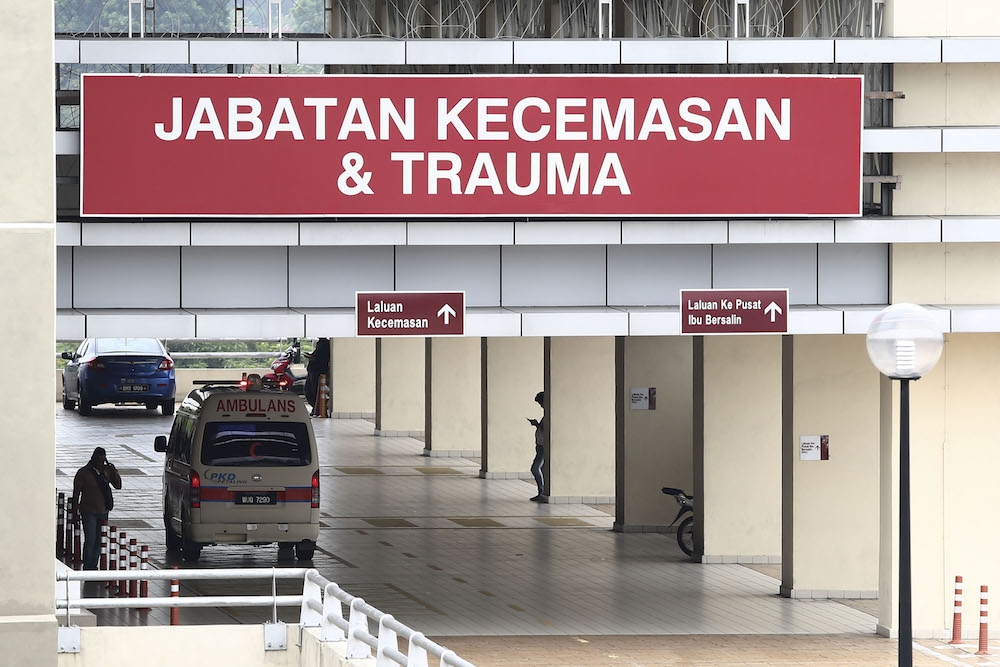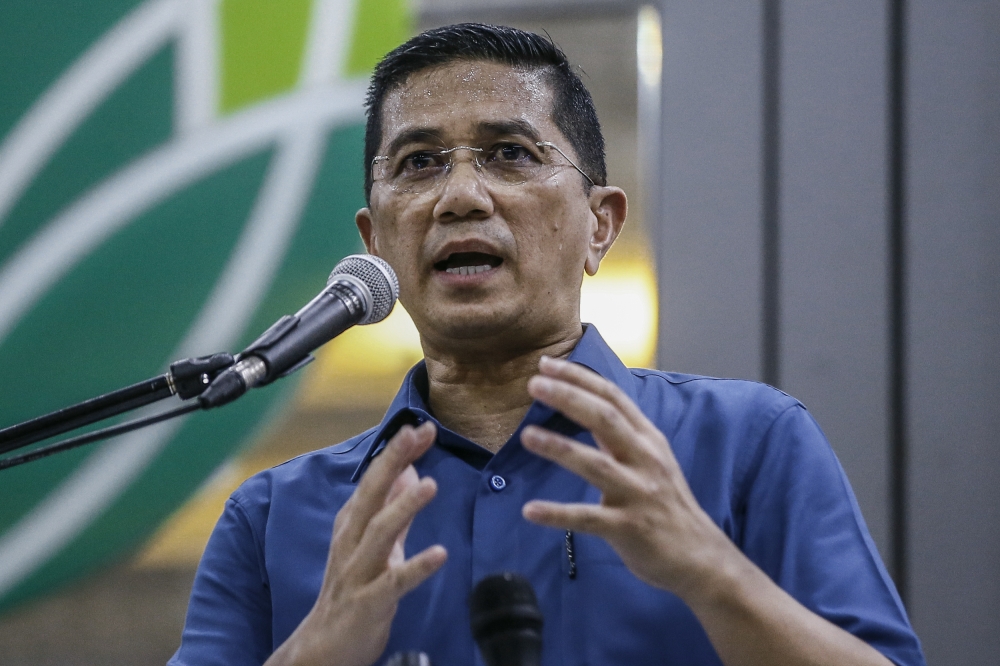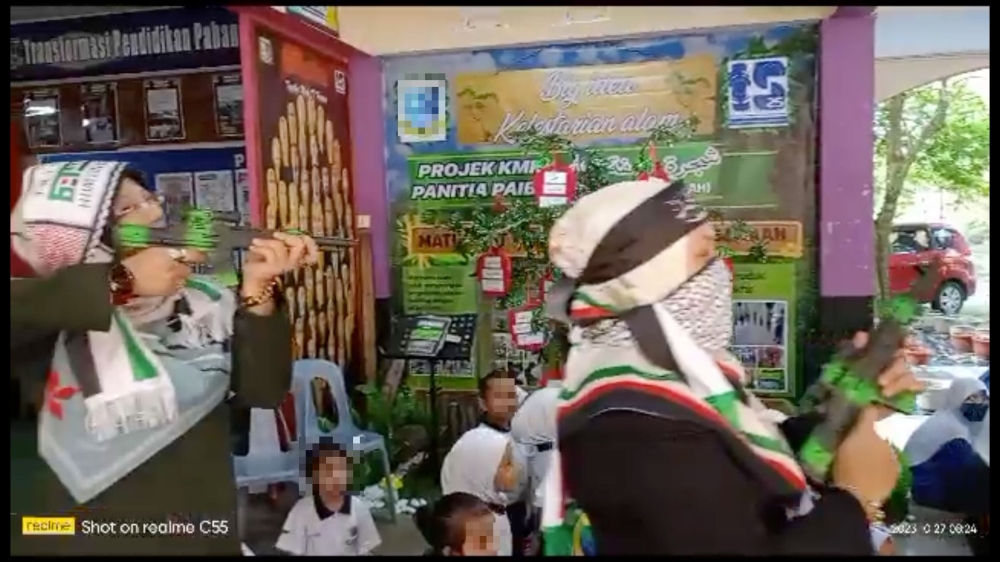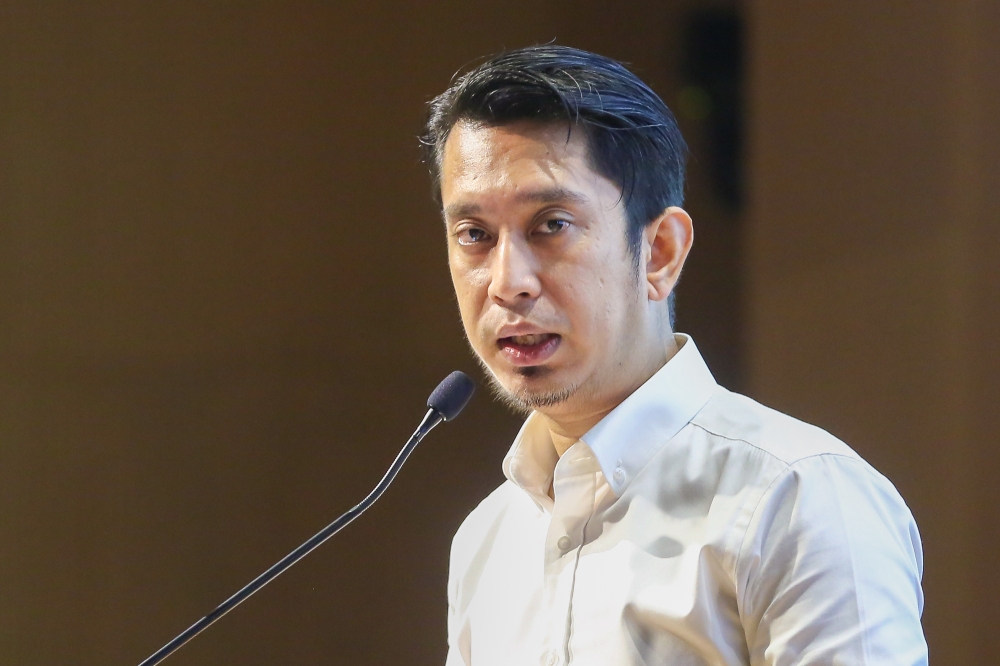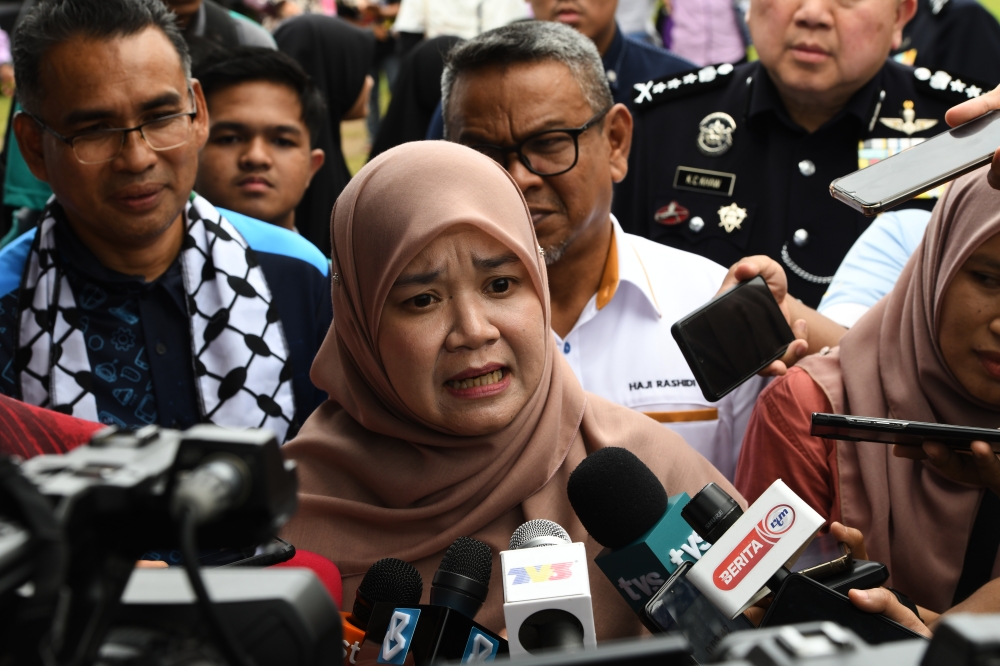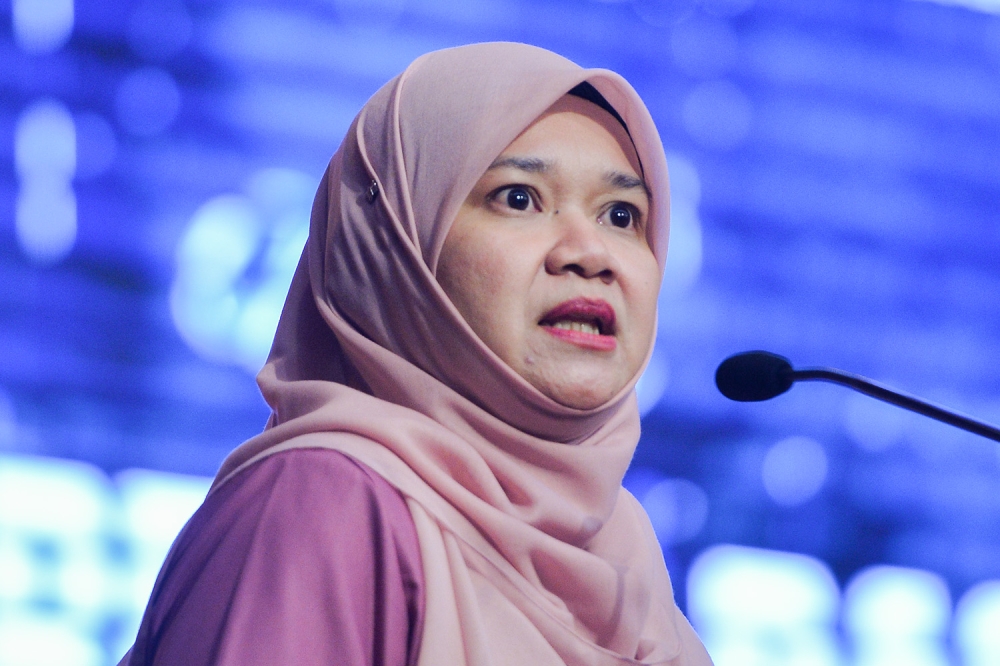KUALA LUMPUR, Oct 30 — Even before the Education Ministry-backed Palestine Solidarity Week officially kicked off in Malaysia’s schools yesterday, videos of teachers and students holding toy weapons to express solidarity with Palestine amid the ongoing conflict with Israel went viral last week.
As the Education Ministry commenced investigations into these unsanctioned incidents, two counterterrorism experts told Malay Mail that toy weapons do not belong in schools due to the risk of potential future radicalisation and exposure to violence, while another said a thoughtful and respectful conversation with pupils would have been the better and preferred approach.
Ahmad El-Muhammady Muhammad Uthman El-Muhammady, associate fellow at the International Centre for Counter-Terrorism (ICCT) at The Hague, Netherlands, disagreed with the decision by some teachers in Malaysia to wield toy guns on school grounds in support of Palestine.
“The people involved did not have a ‘security’ mindset when they did the act — which is dangerous and politically wrong — all in the name of having fun. Kids like playing with guns so teachers want to have a good time, but the strategy is not right,” he told Malay Mail when contacted.
Ahmad El-Muhammady said it was “OK to show support for Palestine” but noted this is a “sensitive issue”, adding: “And with Malaysia being a multicultural and multiracial country, things like this will raise eyebrows.”
“Bit overstretching the point when using guns because we are now teaching kids a culture of violence and exposing them to ‘paramilitary’ culture,” he cautioned.
Ahmad El-Muhammady, who is also assistant professor at the International Islamic University Malaysia’s International Institute of Islamic Thought and Civilisation (ISTAC), said a “sober mindset” should prevail.
He said that “not all Jews are bad” and that many had also condemned the current situation, saying that what should be denounced are actions and not people.
“They are a group of people, a race, and we cannot condemn people, just the act. Victims of Hamas are also asking people not to seek revenge and for an end to the fighting. If we don’t maintain our composure, bad things can happen,” he said.
When asked if it should stop Palestine Solidarity Week, which is scheduled to run from October 29 to November 3, he said the Education Ministry should introduce some form of standard operating procedures (SOPs) to avoid “letting radical sentiments control people’s minds.”
“Don’t plant a seed that grows into something violent. Get good SOPs and guidelines for such activities if they are to continue,” said Ahmad El-Muhammady.
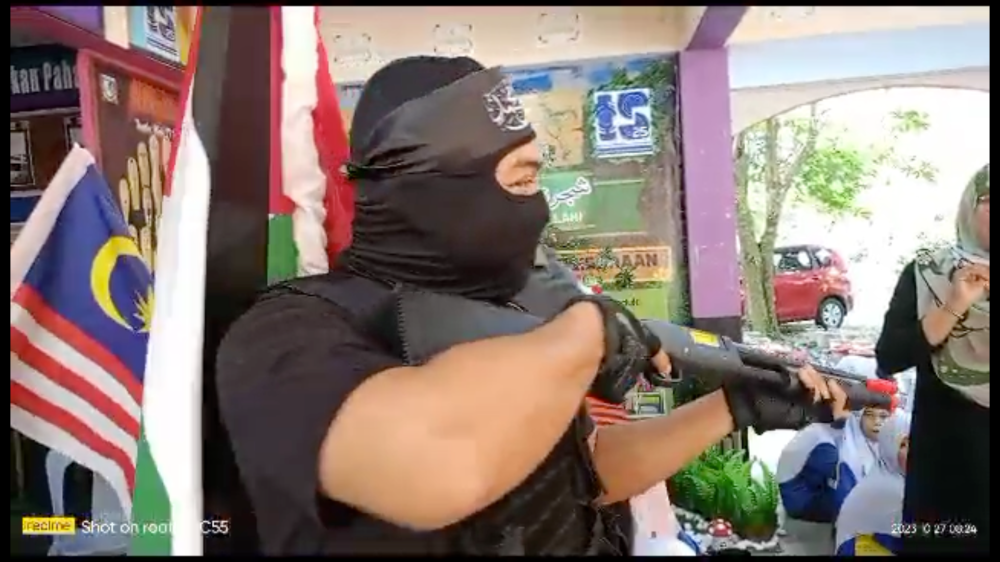
Andrin Raj, director of the Nordic Counter Terrorism Network, said the Education Ministry should not be involved with issues related to a political standpoint, nor should it advocate any activism as it is not the right platform for the ongoing situation in the Middle East.
He also said the conflict should not be viewed through the prism of religion but a humanitarian one, noting the October 25 statement by 17 civil society groups who voiced their disagreement with Palestine Solidarity Week in schools.
“The video screenshot of a man holding a ‘toy’ weapon and two children also holding ‘toy’ weapons appears to advocate ‘violence’ within a public education institute that represents Malaysians of all races and religions. This is clearly not humanitarian advocacy by the school that did this.
“As for radicalisation in schools across the country, this is not new. Institutionalised radicalisation has been going on in Malaysia for decades, but it has always been swept under the carpet,” Andrin, who is also a European Research Community on Radicalisation (ERCOR) researcher, told Malay Mail when contacted.
He cautioned that what begins as initial empathy for common frustrations could lead to a more radical mindset.
“Students may find themselves in a position where they are being encouraged to test boundaries,” he cautioned, adding that “this will one day backfire” should these radicalised students become leaders with the power to chart the future direction of the country.
Andrin cautioned that teachers in the school in Malaysia who were seen in a recent video wearing balaclavas and holding toy weapons “might be just the ticket to sway or strengthen an opinion or an interest”. He further warned of the risk that radical and terrorist groups could capitalise on such influences.
Also asked if the Education Ministry should cease Palestine Solidarity Week and its related activities, Andrin said: “The Ministry of Education should stop all its actions on the current political issues arising from the Palestinian-Israeli conflict as it is not its forte. Any policies related to the conflict should be left to the Prime Minister’s Department.”
As for the Education Ministry’s statement that the incidents involving toy weapons took place before Palestine Solidarity Week and did not follow the ministry’s guidelines, Andrin suggested that “this clearly shows that there were no risk measures taken by the ministry itself as well as any advisory from the Prime Minister’s Department.”
“The authorities should take stern action against the headmaster of the school as well as the teachers who were involved in carrying those toy weapons. Malaysia does not need teachers who are teaching violence to students!
“The education system should not be a platform for any political or radical views that may lead to internal security threats to Malaysia’s multiracial society,” Andrin, who is also the South-east Asia regional director at the International Association for Counterterrorism and Security Professionals, said.
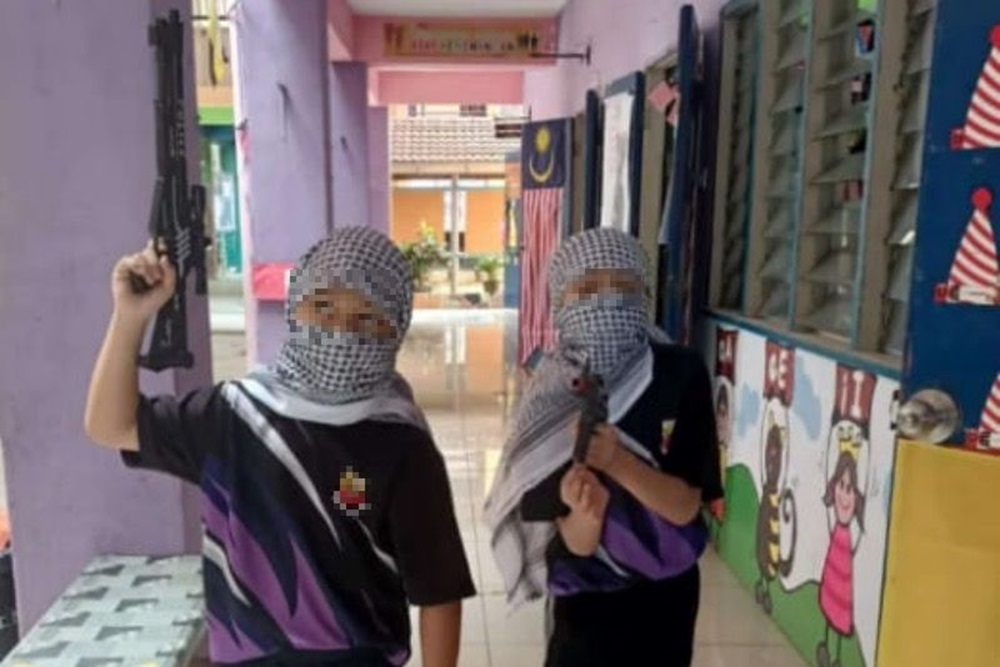
Munira Mustaffa, who is an expert in counter-terrorism and countering violent extremism (CVE), however, explained to Malay Mail that toys are not a reliable indicator of extremist leanings.
She also said the Education Ministry should have taken measures to avoid any misunderstandings about what Palestine Solidarity Week would involve and stressed that any discussions with schoolchildren on such a serious topic should be handled compassionately.
“The Ministry of Education has probably been very hasty in initiating Palestine Solidarity Week, which seems like an impulsive response in light of the recent escalation. Potential consequences of schools or faculty not following existing guidelines should have been considered when the programme was launched, and appropriate and immediate measures should have been taken to mitigate them immediately.
“Strict guidelines should have been clearly and concisely spelled out in communications to schools so that there were no misunderstandings what the programme should entail,” she told Malay Mail when contacted.
“An issue as serious as this conflict should be handled with care, and if a conversation must be had with children in school, it must be done with compassion, respect and sensitivity. The question of whether schools or teachers are equipped to handle this is certainly up for debate,” said Munira, who is also founder and executive director of Chasseur Group, a research and analytical consulting firm specialising in security challenges.
Munira, who is also a visiting fellow at the International Centre for Counter-Terrorism (ICCT), The Hague, told Malay Mail: “Toys or replicas or even clothing are not reliable indicators of extremism in this context. That’s not how people become extremists or are radicalised — it doesn’t work like an assembly line.
“But given that there are reports of increasing hate crimes and hate speech against Muslims and Jewish people and there are communities that are hurting in this wave of animosity and hostility, I think schoolchildren could benefit from a thoughtful conversation about what solidarity should look like to make it meaningful and why violence, polarising rhetoric, or hate speech should never be part of the picture.”
When it was highlighted that Prime Minister Datuk Seri Anwar Ibrahim had recently cited the need to oppose Israel’s aggression on Palestine to prevent the spread of extremism and terrorism, Munira said she was “not a big fan of being speculative”.
“The conflict has been ongoing for decades, but for most parts, a lot of the extremist and terrorist movements that emerged in the last 30 years do not centre Palestine in their ideology. Group grievances can be complex. Conflating Hamas with Islamic State is obviously wrong for many reasons; they are not the same thing,” said Munira, who is also a non-resident fellow of the US-based non-partisan think tank New Lines Institute for Strategy and Policy.
Following the viral incidents recently involving toy weapons in certain schools, Anwar said Putrajaya will not force any schools to participate in Palestine Solidarity Week, and that all activities carried out during the week would be monitored closely and steps will be taken to ensure that they do not go out of control.
The Education Ministry has also since said that the use of replica weapons and any elements of extremism and violence are not allowed during Palestine Solidarity Week in schools, and said this event should feature activities that support humanitarian issues and be used as a platform to educate students about noble values, tolerance, compassion and mutual respect.
The Education Ministry has also ordered an investigation into the toy weapon replicas found in a school as seen in photographs and videos, and said action will be taken on any schools found to have violated the ministry’s guidelines on Palestine Solidarity Week.
The ministry previously said Palestine Solidarity Week would involve all institutions of education nationwide under its purview, namely schools, vocational colleges, matriculation colleges, and teacher education institutes.
Read here to see what experts previously told Malay Mail about preventing extremism through empathy, education and having conversations.
Here’s what experts told Malay Mail previously about preventing violent extremism and the complex reality where extremism may not necessarily be due to religious factors alone as multiple factors may be in play.










